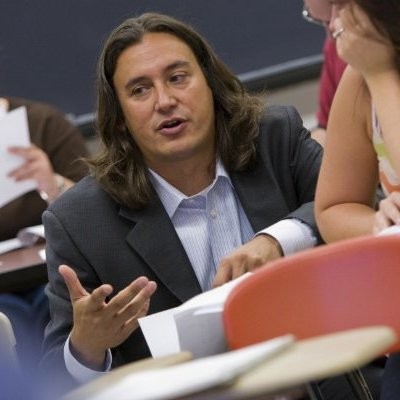
Robert J. Helfenbein
- Courses1
- Reviews1
- School: Loyola University Maryland
- Campus:
- Department: Education
- Email address: Join to see
- Phone: Join to see
-
Location:
4501 North Charles Street
Baltimore, MD - 21210 - Dates at Loyola University Maryland: March 2016 - March 2016
- Office Hours: Join to see
Biography
Loyola University Maryland - Education
Resume
2013
Indiana University Trustees’ Teaching Award
2007
Indiana University Trustees’ Teaching Award
2004
Outstanding Paper
AERA SIG Research in Social Studies
2000
Doctor of Philosophy - PhD
Curriculum
Culture
and Change
University of North Carolina at Chapel Hill
PhD
Education
American Educational Research Association
Association for the Advancement of Curriculum Studies
National Council of the Social Studies
1995
MA
Social Science Education (history & geography)
President of the Graduate Student Body
Curriculum Design
Conflict Resolution
Community Outreach
Teacher Training
Analysis
Courses
Theory
Nonprofits
Publishing
Research
Program Evaluation
Qualitative Research
Program Management
Teaching
Editing
Grant Writing
Higher Education
Social Studies
Public Speaking
Curriculum Development
Mason
T. &. Helfenbein
R. (Eds.). (2012). The ethics of international curriculum work: The \tchallenges of culture and context. Charlotte
NC: Information Age Publishing.
Terrance Mason
Civic Identity
Public Education and the African-American Community in Indianapolis: Mending the Fracture
Civic Identity
Public Education and the African-American Community in Indianapolis: Mending the Fracture
Robert J.
IUPUI
Loyola University Maryland
Mercer University's Ph.D. Programs of the Tift College of Education
Center for Urban and Multicultural Education
Loyola University Maryland School of Education
Baltimore
Maryland Area
Interim Chair
Department of Teacher Education
Loyola University Maryland School of Education
Administration at the University
School and student level to support day-to-day internal operations. Participation in enrollment management
tuition setting and enrollment projection initiatives. Supervision of Dean's office staff. Oversight of marketing
recruitment and admissions practices for the School. Budget oversight. Teach up to two classes in the School of Education per calendar year.
Loyola University Maryland
Associate Professor of Curriculum Studies
Courses taught in Curriculum Theory
Qualitative Research Methods
Urban Education
and Social Theory
IUPUI
Center for Urban and Multicultural Education
Strategic Priorities________________________________________\n\n1.\tImproving education through research and evaluation of high-impact
research-based community programs;\n2.\tEncouraging cultural competency in teaching
curriculum
program design and evaluation in the pursuit of equitable education for all learners;\n3.\tExpanding knowledge and narrowing the research and practice gap by working with communities on impact studies of contemporary urban education reform;\n4.\tUndertaking rigorous research and program evaluation on issues in urban educational settings and with underserved populations to reverse inequities
and promote positive changes in education reform related to programs such as Science
Technology
Engineering
and Mathematics (STEM) and Problem Based Learning (PBL).\n\n\n\nThe Center for Urban and Multicultural Education was shaped in 1979 and provides the School of Education at Indiana University with a voice in the nation´s long-standing debate about the role and function of public education in our cities
where schools serve most of our poor and cultural minorities. CUME began by serving as a clearinghouse for knowledge diffusion and professional training. The center functioned to distribute information through conferences
seminars
and symposia
on such topics as the condition of urban and multicultural education in the nation
sex and racial discrimination in schools
university cooperation
and student discipline. This work continues with a renewed interest in collaborative work with community partners in varied contexts
including some at the international level.
Director
Indianapolis
Indiana Area
Loyola University Maryland
Mercer University's Ph.D. Programs of the Tift College of Education
Atlanta
Georgia
United States
Associate Dean for Research & Faculty Affairs
The Foundation sponsors the Bergamo Conference on Curriculum Theory and Classroom Practice which has served as a gathering place for theorists/practitioners and practitioners/theorists
including teachers
students
scholars
administrators
cultural workers
from various perspectives and all walks of life
to join in dialogical and collaborative encounters since 1969. Committed to bringing different and diverse discourses into public conversations
the conference welcomes all viewpoints in forming a shared community of dissensus. The conference encourages innovative styles of presenting intellectual work in the field of curriculum theory.\nFor more information: http://www.jctonline.org/about/\n
President
Foundation for Curriculum Theory
English
Early Career Award
AERA SIG Critical Issues in Curriculum and Cultural Studies
2005-2006
